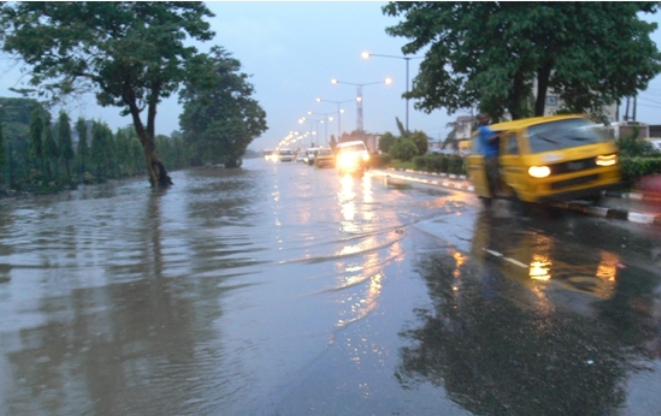The Lagos State government has warned residents to get ready for a massive rainy season this year. The state is expected to receive between 240 to 270 days of rainfall in 2020.
The Commissioner Environment, Lagos Mr Tunji Bello, who stated this during a press briefing on the Year 2020 Seasonal Rainfall Predictions and prevention of flooding in the State on Tuesday, added that the maximum annual rainfall is predicted to be 1,750mm.
Read also: Lagos moves to ban single use plastic
While giving reference to a report obtained from the Nigerian Meteorological services (NIMET), the commissioner stated that the earliest predicted onset of the rainy season is 17th March with other areas following.
He added that the rainy season is expected to cease earliest by 22 Nov in Surulere with other areas following after.
“Ikeja is expected to have about 1526mm, while that of Badagry is 1750mm, Lagos Island with 1714mm, Ikorodu with 1690mm and Epe with 1730mm of rainfall.
“Lagos Island was expected to have a rainfall onset date of 19th March with an error margin of three days, while its cessation date is expected to be 26th of November,” he stated.
The Environment Commissioner noted that this year’s prediction by NiMeT is based on the global consensus that El-Nino Southern Oscillation (ENSO) is at the neutral phase which will continue till around August or September.
Bello explained that residents staying coastal areas will witness flash-floods which he describes as ‘natural’, but it will disappear in a matter of time if the drains are clean.
“As long as the drains are clean, we should be assured that, in a matter of time, the flash flood will disappear,” he said.
Read also: Environmentalist calls for ‘trash blindness’ sensitisation
“It must be noted that anytime the Lagoon level rises, it may “lock-up” the discharge points drainage channels and until it recedes, there will be no discharge. Occurrences like these also cause backflows, resulting in flooding.”
He added that the state government is collaborating with Ogun-Osun River Basin Development Authority and this has ensured control and monitoring of the release of water from Oyan Dam to prevent flooding of the downstream communities;
According to him, since last year the Emergency Flood Abatement Gang under Drainage Maintenance Department of the Ministry have been consistently de-silting and working on secondary collectors and conduits, to enable them to discharge efficiently.
The Commissioner advised Lagosians who reside along flood plains, coastal and low-lying wetland areas near major rivers to always be on the alert and be ready to relocate when the need arises.
He called on the state residents to desist from acts that can lead to flooding such as indiscriminate dumping of refuse in unauthorised places.

















